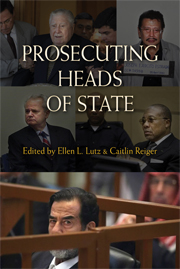Book contents
- Frontmatter
- Contents
- List of Contributors
- About the International Center for Transitional Justice
- Foreword
- Preface
- 1 Introduction
- 2 Prosecutions of Heads of State in Europe
- 3 Prosecutions of Heads of State in Latin America
- 4 The Multiple Prosecutions of Augusto Pinochet
- 5 A Leader Takes Flight: The Indictment of Alberto Fujimori
- 6 Charm and Punishment: How the Philippines' Leading Man Became Its Most Famous Prisoner
- 7 Shifting Legitimacy: The Trials of Frederick Chiluba
- 8 A Justice “Trickle-Down”: Rwanda's First Postgenocide President on Trial
- 9 Justice Squandered? The Trial of Slobodan Milošević
- 10 A Big Man in a Small Cell: Charles Taylor and the Special Court for Sierra Leone
- 11 Political Pedagogy, Baghdad Style: The Dujail Trial of Saddam Hussein
- 12 Conclusion
- APPENDIX: List of Prosecutions of Heads of State or Government since 1990
- Selected Bibliography
- Index
10 - A Big Man in a Small Cell: Charles Taylor and the Special Court for Sierra Leone
Published online by Cambridge University Press: 06 August 2009
- Frontmatter
- Contents
- List of Contributors
- About the International Center for Transitional Justice
- Foreword
- Preface
- 1 Introduction
- 2 Prosecutions of Heads of State in Europe
- 3 Prosecutions of Heads of State in Latin America
- 4 The Multiple Prosecutions of Augusto Pinochet
- 5 A Leader Takes Flight: The Indictment of Alberto Fujimori
- 6 Charm and Punishment: How the Philippines' Leading Man Became Its Most Famous Prisoner
- 7 Shifting Legitimacy: The Trials of Frederick Chiluba
- 8 A Justice “Trickle-Down”: Rwanda's First Postgenocide President on Trial
- 9 Justice Squandered? The Trial of Slobodan Milošević
- 10 A Big Man in a Small Cell: Charles Taylor and the Special Court for Sierra Leone
- 11 Political Pedagogy, Baghdad Style: The Dujail Trial of Saddam Hussein
- 12 Conclusion
- APPENDIX: List of Prosecutions of Heads of State or Government since 1990
- Selected Bibliography
- Index
Summary
On March 29, 2006, a United Nations (UN) helicopter carrying former Liberian president Charles Taylor flew over Sierra Leone's capital, Freetown, and landed in the fortified compound of the Special Court for Sierra Leone (Special Court). Cheering crowds flowed into the streets around the Special Court at the sight of the arriving helicopter, and once it landed, Charles Taylor entered cell number three at the court's detention center to await his trial on charges for war crimes and crimes against humanity. Only a few weeks earlier, Taylor had seemed untouchable, comfortably exiled in a Nigerian villa for almost three years in a deal that had been backed by international and regional leaders. During more than a decade of twisting and turning fortunes, Charles Taylor had been emblematic of impunity in West Africa. This chapter chronicles how the existence of an independent prosecutor backed by a joint national-international court, interrupted the all-too-common African tradition of giving former leaders accused of serious crimes a comfortable exit once they relinquish power. Over the years, Taylor rose from a wily official who fled his country to evade corruption charges and reportedly escaped from a U.S. prison, to a successful warlord enmeshed in the power struggles of West African politics, to the elected president of Liberia with a penchant for dramatic displays of power.
- Type
- Chapter
- Information
- Prosecuting Heads of State , pp. 205 - 232Publisher: Cambridge University PressPrint publication year: 2009
- 21
- Cited by



